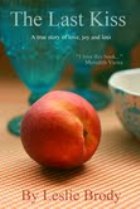Writing Backwards
By Leslie Brody, author of The Last Kiss
 I wrote “The Last Kiss” backwards.
I wrote “The Last Kiss” backwards.
That’s not a method I would particularly recommend, but it certainly worked for me. Here’s hoping that my unorthodox process will prove instructive.
But first, some background.
The book chronicles how my husband, Elliot and I made the very most of our final two years together after he was hit with a deadly diagnosis of inoperable pancreatic cancer. Elliot was a brilliant, funny and romantic news editor, and we discovered a depth of happiness together that I never imagined being lucky enough to find. Despite the relentless medical dramas in those last few years, we had a beautiful, rich time, and I don’t want to forget any of it. Writing the book kept those days safe from the fickle distortions of a fragile memory.
When Elliot died in late 2008, I was beyond devastated. A widow at 47, with two kids and three stepchildren, the future looked completely empty and uncertain. There was simply nothing pulling me forward.
Typing out a few words for Elliot’s memorial service felt so peaceful I wanted to keep on doing it. If I worked on a book, I realized, I could think deeply about our life together and take heart that the project felt productive rather than wallowing. Who wanted to descend into the ugly black mud pit of self-pity?
In a miracle of timing, I met a novelist, Laurie Lico Albanese, who promised to teach me how to write memoir. On Wednesday nights in her attic she showed my class how to spin small moments into personal narrative. As a longtime newspaper reporter, I was used to writing about facts but not feelings, and needed her help to loosen up.
Start with concrete objects, Laurie said, and explore what they mean. Write with all five senses. Cut out every unnecessary word.
Often she gave us prompts. Write about what’s in your purse, she said. Write about hair. Write about a sound. My response to that one became a favorite book chapter, “How to Sleep With Your Husband in His Hospital Bed.”
Make a list of scenes to tackle, she said. I plugged away at them, one at a time, following Nora Roberts’ Number One Rule for Writing: “Ass in chair.”
One of the first scenes on my list was my husband’s torturous final night. Terminal agitation, said the glossy hospice brochure. I wrote that feverish episode in all its raw anguish while it was still raging in my mind. When I put it down on paper, it stopped harassing me.
Then I wrote about his illness, and how I did my best to take care of him.
Then about our courtship.
And then about how we met.
Going backwards in time, back to days of hope and contentment, took me to a calm place inside. The sweetest memories flooded in. I worked on funny scenes when I felt lighthearted, and picked the painful ones when I needed to vent.
They say writing can be healing. It was a blessing to find that was true.
When I had finished about 40 short scenes, I lay them all out around my bedroom to stack them in chronological order. That became my first draft. Then I massaged it, polished it, and sent it to an agent. She offered to represent me on the spot.
Now I can hold “The Last Kiss” in my hands. My marriage to Elliot has a beginning and an end, safe between two covers. I can reread my book to dive into the past when I need to, and carry it with me as I push forward.
People who have read “The Last Kiss’’ tell me our story has helped them too – whether they love someone with a serious illness, or simply crave evidence it’s possible to find such a deep connection with a partner. It’s gratifying to know that even now Elliot, so full of humor, grit and grace, can mean so much to so many.
 For more information, please go to www.lesliebrody.com
For more information, please go to www.lesliebrody.com
Leslie Brody covers education for The Record newspaper in New Jersey. The Last Kiss, ther first book, grew out of a national award-winning series in The Record called “Living with Cancer.”
Leslie has been a reporter for The Associated Press in Tokyo, Fortune Magazine and The St. Petersburg Times.
Her work has won a National Headliners Award as well as prizes from the Child Welfare League of American, the Association of Health Care Journalists, the Casey Journalism Center on Children and Famlies, the New Jersey Press Association and The Washington Monthly.
A 1983 Yale graduate, she live in New Jersey with her children.

